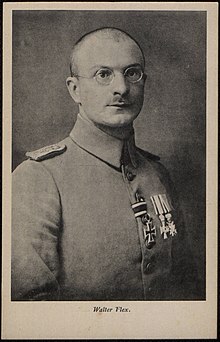Walter Flex
| Walter Flex | |
|---|---|
 |
|
| Born |
6 July 1887 Eisenach, German Empire |
| Died | 16 October 1917 (aged 30) Pöide Parish, Russian Empire |
| Nationality | German |
| Occupation | Author, Lyricist |
Walter Flex (6 July 1887 – 16 October 1917) was a German author responsible for The Wanderer between the Two Worlds: An Experience of War (Der Wanderer zwischen beiden Welten) of 1916, a war novel dealing with themes of humanity, friendship, and suffering during World War I.
Born in Eisenach to a secondary school teacher, he went to the University of Erlangen where he studied German, thanks to the award of a bursary. In his brief life prior to the outbreak of war he worked as a teacher, publishing, amongst other works, Das Volk in Eisen and Sonne und Schild, a series of well received nationalist works. As a song, his poem Wildgänse rauschen durch die Nacht gained popularity with the Wandervogel youth and was well known and sung in Germany until the 1970s.
He enlisted as a volunteer at the outbreak of war in 1914. He was injured in action and died on October 16, 1917 at Oti Manor, Saaremaa, Estonia. He was originally buried at the village cemetery of Peude (now Pöide), Saaremaa island (formerly Ösel Island), Estonia. His epitaph was a quote from one of his works Preußischer Fahneneid ("Prussian Military Oath" written in 1915): "Wer je auf Preußens Fahne schwört, hat nichts mehr, was ihm selbst gehört." (Translation: "He who swears on Prussia's flag has nothing left that belongs to himself.") His body was later, in 1940, moved to a new military cemetery in front of the Sackenheimer Tor at Königsberg (now Kaliningrad, Russia). Walter Flex's grave, along with much of the city, was destroyed either in air raids or during the three-month siege prior to that city's April 9, 1945 surrender to the Russian Army.
His Wanderer zwischen beiden Welten was published in 1916, by Verlag C. H. Beck, and was well received. By 1917, over 700,000 copies had been printed in Germany—a testament to his extreme popularity with the wartime public. His reputation grew in the post-war years and his romantic idealism was exploited by the Nazi party, which found his evocative and romantic lyricism especially appealing and considered it an expression of Aryan ideals.
...
Wikipedia
